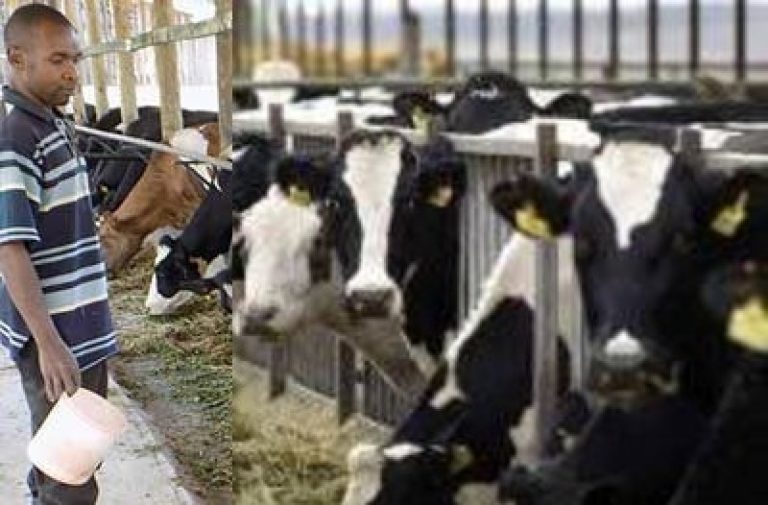
Dairy and poultry farming: Henry Muriuki first ventured into serious agriculture in 2013 when he decided to increase his livestock and crops at his farm in Mikunduri village in Kirinyaga. He named his farm Heber Farm, and since then his farm has been a beacon of good and profitable mixed farming. In fact, today, his farm is one of the major producers of cow and goat milk, pigs and poultry products and coffee in Kirinyaga.
He boasts of a herd of 36 pedigree cattle, 15 of which are currently lactating. Two others are about to give birth.

The farm produces between 280 and 300 litres of milk daily. This milk is sold fresh at the farm’s milk bar opposite Mukinduri primary school or as locally manufactured yogurt. The excess is sold to Kirinyaga Farmers Dairy Society in Kerugoya town, says farm manager John Mutiga.
A litre of milk at the dairy fetches Sh33, but the same volume fetches at least Sh100 when processed into yogurt or mala (sour milk).
“The highest producing cow gives us 30 litres every day. We have been improving our cows using imported semen such as Altanato from Bermuda. We expect the in-calf heifers to produce even more,” says Mutiga.
The heifers are fed on nappier silage before they are introduced to maize silage, which is more nutritious. Heber farm makes its own silage from a mixture of hay, desmodium, lucerne, and concentrates. The farm has 30 acres under green maize and three acres under lucerne and desmodium to ensure the livestock have enough food.
The cows have access to clean drinking water at all times while a vet visits frequently. For their beddings, the farm source for a special type of sandy soil from Mbeere in Embu County and spread it for the cows to sleep on. The sand keeps them warm and free from mud.
The farm plans to expand its herd to 150 lactating cows at any given time. It also plans to start breeding in five years’ time.
Currently, it sells eight-month old pedigree heifers at Sh70,000 each and in-calf Friesian heifers served with semen from best artificial insemination bulls in the world at Sh300,000 each.
Heber Farm is also renowned for pig farming, which Mutiga says generates a lot of income thanks to a readily available market. Currently, there are 12 sows, 18 maturing pigs, 97 piglets and one boar. Recently, the farm sold off 100 pigs. The pigs do not just defecate anywhere on their dwellings and instead move to a position outside their pen where cleaning is easy.
At any given time, the farm has only one boar, which is changed after a while to prevent inbreeding. Mutiga says they plan to start artificial insemination of pigs.
The farm sells piglets aged three months at Sh3,500, a seven-month, medium-sized male that is about to serve at between Sh20,000 and Sh25,000 and a pregnant gilt (a pig that hasn’t had piglets) at Sh35,000.
To tap on the growing demand for goat milk, Heber started a dairy goat farm in 2014 and has a flock of Sanen, Kenyan alpine and Toggenburg breeds. Milk production per goat averages between 2.5 and three litres, with highest producer at four litres.
Heber also boasts of a poultry section where it rears more than 1,500 chicken and hundreds of pigeons, quails, turkey, geese and ornamental birds. The chicken are mainly KARI improved, Kuroilers and rainbow roosters. The livestock section of the farm covers five acres. Heber also boasts of a coffee plantation that currently has 10,000 stems. The farm produced 40,000kgs of berries from 2,000 mature stems last season.






Congrats Mr Peter Muriuku,
Kindly, let me have contacts of this farmer, the proprietor of Herber farm.
Comments are closed.